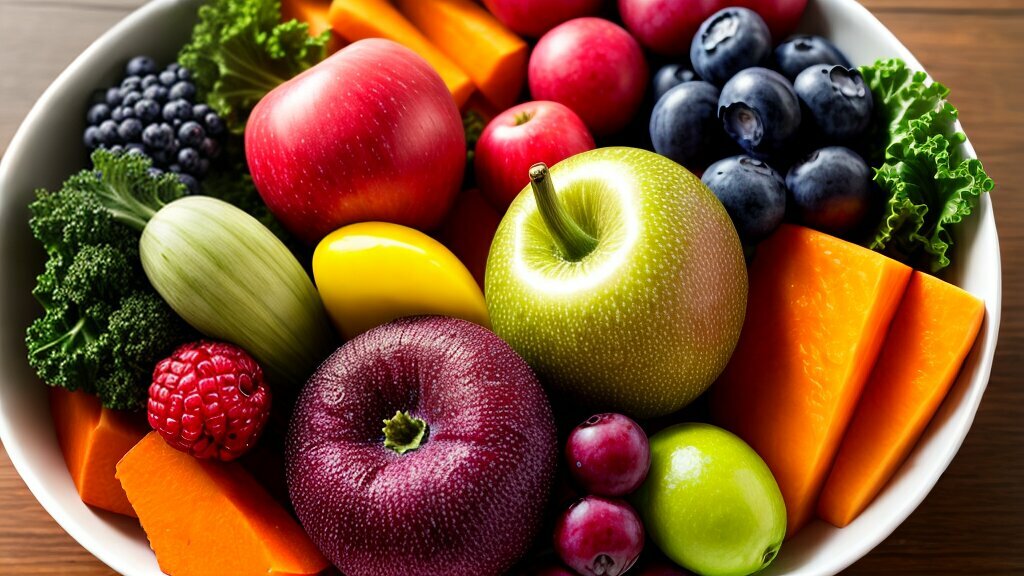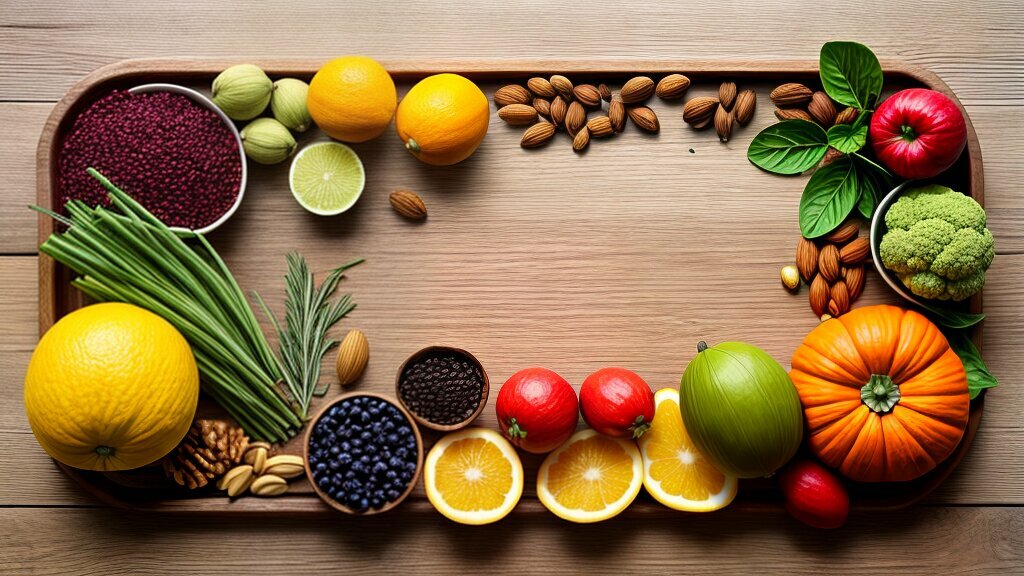Welcome to our guide on how to boost your health with nutrient-rich foods. Eating a balanced diet full of essential nutrients is crucial for maintaining good health and preventing chronic diseases. This guide specifically caters to Australians, ensuring you have access to locally sourced foods that are easily integrated into your diet.
Consuming nutrient-rich foods can provide you with numerous benefits like a strengthened immune system, better digestion, and improved energy levels. So, let’s delve deeper into the power of nutrient-rich foods, and how they can help you lead a healthy life.
Key Takeaways:
- Eating a balanced diet of nutrient-rich foods is essential for optimal health.
- Nutrient-rich foods provide various vitamins, minerals, and essential nutrients that are necessary for your body.
- Incorporating nutrient-rich foods into your diet can help you manage your weight, boost energy levels, improve digestion, strengthen the immune system, and promote longevity.
- This guide caters to Australians and provides a list of nutrient-dense foods that are easily accessible.
- You can plan nutrient-rich meals by controlling portions, meal prepping, and incorporating a variety of food groups in each meal.
- Overcoming challenges in adopting a nutrient-rich diet can be done through education, meal planning, and finding healthier alternatives.
- While supplements can complement a nutrient-rich diet, they should not be relied upon as a substitute for a well-rounded diet.
The Power of Nutrient-Rich Foods
When it comes to maintaining good health, nutrient-rich foods should be a top priority in your diet. These foods provide essential vitamins and minerals that support bodily functions and promote overall well-being.
Nutrient-rich foods are those that are packed with vitamins, minerals, and other essential nutrients that your body needs to function properly. These foods come from a variety of sources, including fruits, vegetables, lean proteins, whole grains, and healthy fats. By incorporating a variety of these foods into your diet, you can ensure that you are receiving a balanced intake of essential nutrients.
The Various Nutrients in Nutrient-Rich Foods
Nutrient-rich foods are an excellent source of a variety of vitamins, minerals, and essential nutrients. These include:
| Nutrient | Sources |
|---|---|
| Fiber | Whole grains, fruits, vegetables, beans |
| Calcium | Dairy products, leafy greens, fortified foods |
| Vitamin C | Citrus fruits, berries, tomatoes, peppers |
| Iron | Lean meats, beans, leafy greens, fortified foods |
| Protein | Lean meats, poultry, fish, beans, nuts, seeds |
These nutrients all play a crucial role in maintaining good health. For example, fiber helps to regulate digestion and promote healthy bowel movements, while calcium helps to build and maintain strong bones and teeth. Vitamin C is important for supporting a healthy immune system, and iron helps to transport oxygen throughout the body.
By consuming a variety of nutrient-rich foods, you can ensure that you are receiving a balanced intake of these essential nutrients.

Image source: seowriting.ai
The Benefits of Nutrient-Rich Foods for Your Health
Choosing nutrient-rich foods is an essential part of maintaining a healthy diet. Consuming a balanced variety of foods rich in essential nutrients, vitamins and minerals can help improve your overall well-being.
These nutrient-rich foods support weight management by reducing hunger and providing long-lasting energy. In addition, they strengthen your immune system, promote healthy digestion and support longevity.
For example, including iron-rich foods like lean red meat, poultry or fortified cereals in your meals can help prevent iron deficiency anaemia. Consuming omega-3 rich foods like oily fish, chia seeds or flaxseeds can help reduce inflammation, lower cholesterol levels and benefit your heart health. Including dark leafy greens like kale or spinach in your diet can help improve bone density and reduce the risk of fracture.

Choosing a diet rich in nutrient-dense foods can have a positive impact on your mental and emotional health as well. Studies have shown that consuming a balanced diet with plenty of fruits, vegetables, whole grains, lean proteins, and healthy fats can reduce the risk of depression and anxiety.
Including nutrient-rich foods in your diet can also improve your energy levels, cognitive function and support healthy ageing. So make it a priority to choose nutrient-rich foods every day to improve your health and well-being.
Nutrient-Dense Foods for Australians
When it comes to consuming nutrient-rich foods, it’s crucial to know which foods to include in your meal plan. Here’s a list of nutrient-dense foods that are easily accessible in Australia:
| Food Group | Examples |
|---|---|
| Fruits | Berries, kiwi, oranges, mangoes, bananas, apples |
| Vegetables | Broccoli, spinach, kale, tomatoes, sweet potatoes, carrots, capsicum |
| Whole Grains | Brown rice, quinoa, oats, whole wheat bread, barley |
| Lean Proteins | Chicken breast, turkey, fish, tofu, legumes, nuts and seeds |
| Healthy Fats | Avocado, olive oil, nuts, seeds, fatty fish like salmon |
Including a variety of these foods in your diet can help you achieve a balanced nutrient intake. Try incorporating them into your meals and snacks throughout the day. For example, start your day with a bowl of oatmeal topped with fresh berries and nuts, have a salad with leafy greens and grilled chicken for lunch, and wrap up your day with a quinoa stir-fry with veggies and tofu.

Remember, consuming nutrient-dense foods is crucial for maintaining good health and overall well-being. It is essential to choose a variety of foods from different food groups to ensure you are getting all the nutrients your body needs.
The Role of Supplements in Nutrient-Rich Diets
While a healthy, balanced diet should provide all the nutrients your body needs, there may be situations where supplements are beneficial.
For example, if you have a nutrient deficiency or a medical condition that affects nutrient absorption, your healthcare provider may recommend a supplement.
It’s essential to know that supplements should only be taken under the guidance of a healthcare provider.
Remember, supplements are not a substitute for a varied and balanced diet.
Additionally, taking supplements in excess can be harmful to your health.

It’s crucial to choose supplements that are appropriate for your individual needs, as well as choosing a reputable brand that adheres to quality standards.
If you are considering taking supplements, speak with your healthcare provider or a registered dietitian to determine the appropriate type and dosage for your needs.
Overcoming Challenges in Adopting a Nutrient-Rich Diet
Transitioning to a nutrient-rich diet can be challenging, especially when you’re used to certain eating habits. However, with the right mindset and strategies, you can overcome these challenges and achieve your health goals.
One common barrier to adopting a nutrient-rich diet is lack of time. We often resort to fast food or pre-packaged meals when we’re busy or tired. To overcome this, try meal prepping on the weekends and packing healthy snacks for when you’re on the go.
Another challenge is the cost of nutrient-dense foods. While some healthier options may be pricier, there are also plenty of affordable options like frozen fruits and vegetables or buying in bulk. Consider shopping at local farmers’ markets or joining a community-supported agriculture program to save money on fresh produce.
Additionally, navigating food labels and nutrition information can be overwhelming. Take the time to educate yourself on what to look for, such as the amount of added sugars or unhealthy fats in a product. Look for whole foods with minimal ingredients and opt for cooking at home instead of relying on packaged meals.
Finally, it’s important to remember that changing your diet is a process and requires patience and perseverance. Celebrate small victories and don’t be too hard on yourself if you slip up. Remember that every healthy choice you make contributes to your overall well-being.

The Role of Supplements in Nutrient-Rich Diets
While a balanced diet rich in nutrient-dense foods should provide most of the essential vitamins and minerals your body requires, there may be some cases where adding supplements to your diet may be necessary. For example, if you have certain medical conditions or dietary restrictions, you may require additional supplementation to meet your nutrient needs.
It is important to note, however, that supplements should not be used as a substitute for a healthy and varied diet. While they can be helpful in filling gaps in your nutrition, they are not a replacement for the benefits that whole foods can provide.
If you are considering adding supplements to your diet, it is important to seek professional advice from a qualified healthcare provider or a registered dietician. They can help you evaluate your nutrient needs and identify supplements that are safe and effective for you.
Additionally, when choosing supplements, it is important to be discerning about quality and brand. Look for reputable brands that have been tested and certified by independent organizations, and always read the label carefully to ensure that the supplement contains the nutrients it claims to have.
Remember, while supplements can be a useful addition to a healthy lifestyle, they should always be viewed as a supplement to, and not a replacement for, a balanced and nutrient-rich diet.

Supplements may be necessary in certain cases, but should not be relied upon as a replacement for a healthy and balanced diet.
Conclusion
Congratulations on taking the first step towards a healthier you! By incorporating nutrient-rich foods into your diet, you are on the path to improving your overall health and well-being. Remember, a balanced diet is key, and consuming a variety of fruits, vegetables, whole grains, lean proteins, and healthy fats will ensure that you receive all of the necessary nutrients.
Planning your meals ahead of time and being mindful of portion sizes can also support your journey towards a healthier lifestyle. Don’t forget to stay motivated and keep track of your progress along the way. If you encounter challenges, don’t hesitate to seek assistance and guidance from a professional nutritionist or dietitian.
By adopting a nutrient-rich diet and making a commitment to healthy eating, you are investing in your long-term health and happiness. Keep up the great work!
FAQ
Q: What are nutrient-rich foods?
A: Nutrient-rich foods are foods that are packed with essential vitamins, minerals, and other nutrients that are beneficial for overall health and well-being. These foods provide a high concentration of nutrients compared to their calorie content.
Q: Why is a balanced diet important for health?
A: A balanced diet is important for health because it ensures that you are getting all the necessary nutrients your body needs to function properly. It helps maintain a healthy weight, supports optimal energy levels, and promotes overall well-being.
Q: How can nutrient-rich foods benefit my health?
A: Nutrient-rich foods have numerous benefits for your health. They can support healthy weight management, boost energy levels, improve digestion, strengthen the immune system, and promote longevity. Consuming these foods enhances your overall health and reduces the risk of chronic diseases.
Q: What are some nutrient-dense foods for Australians?
A: Some nutrient-dense foods that are easily accessible to Australians include fruits, vegetables, whole grains, lean proteins, and healthy fats. Incorporating these foods into your diet ensures a balanced nutrient intake and supports optimal health.
Q: How can I plan nutrient-rich meals?
A: Planning nutrient-rich meals can be achieved by practicing portion control, meal prepping, and including a variety of food groups in each meal. Aim for a balance of carbohydrates, proteins, and fats, and incorporate plenty of fruits and vegetables. Here are some easy-to-follow meal ideas and recipes to get you started.
Q: What are some common challenges in adopting a nutrient-rich diet?
A: Common challenges in adopting a nutrient-rich diet include lack of time, limited access to fresh produce, and difficulty breaking old eating habits. However, by implementing strategies such as meal planning, label reading, and finding healthier alternatives, these challenges can be overcome.
Q: Should I take supplements to complement my nutrient-rich diet?
A: While supplements can be beneficial in certain cases, they should not be relied upon as a substitute for a varied and balanced diet. It is always best to obtain nutrients from whole foods whenever possible. If considering supplements, it is recommended to seek professional advice from a healthcare provider or registered dietitian.
